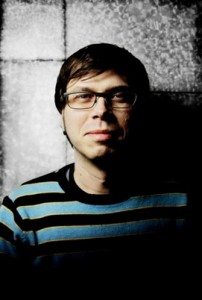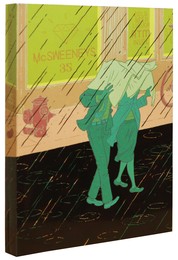[The latest issue of McSweeney’s features a section on Norwegian writing, edited by John Erik Riley and Mikkel Bugge. One of the featured authors, Audun Mortensen, author of the newly released novel Roman, recently conducted an interview with Mr. Riley (whose own novel Heimdal, California is forthcoming soon) in which they discussed: “sly stallone, per petterson’s personal brand, mcsweeney’s, ‘norwegian lit scene’, celebrity chef breakdown.” – BB]


AM: we attended a ‘corporate literary party’ in oslo last week and got alcohol for free. could you outline some american equivalents, in terms of commercial success and literary style, to five of the most ‘prominent’ norwegian authors you spotted at this party?
JER: Hm. Erm. If by prominent you mean interesting and/or awesome, I spotted the following five writers:
Erlend Loe (= Douglas Coupland + Andy Warhol + Dave Eggers)
Roy Jacobsen (= Jonathan Franzen + Jack London + John Irving)
Anna Fiske (= Charles M. Schulz + Chris Ware + Dr. Seuss)
Stig Sæterbakken (= Edgar Allen Poe + Antony Hegarty + William T. Vollmann)
Audun Mortensen (= Stephen Malkmus + Facebook + Ramona Flowers)
AM: interesting… in 2008 you co-wrote an interview book, titled ‘amerikanske tilstander’ (‘american states of mind’), comprising interviews with thirteen american authors. could you say something about why you decided to interview david foster wallace, lorrie moore, william t. vollmann et al., and from your experience with american writers, what seem to be common questions/misconceptions/assumptions re norway/norwegians/norwegian lit?
JER: Let’s see … I’ll try to answer the second question first. When it comes to Norwegian literature, the vast majority had no idea about what is going on now. We started working on the book almost ten years ago and Per Petterson had yet to make his big breakthrough. Most American author’s are painfully well read, however, so they were certainly aware of Hamsun and Ibsen. Vollmann, as it would happen, is a huge fan of Sigrid Undset’s, a fact that surprised us. In hindsight, though, I can see that his Seven Dreams series draws ideas from her historical fiction. With few exceptions, the writers were curious about contemporary Norwegian fiction and poetry. This was particularly true of Vollmann, Dave Eggers and Richard Powers. Now, you asked why we did this book, a collection of interviews with fiction writers from the U.S. Well, my co-authors and I had been reading contemporary American fiction for some time. We were curious about themes and forms we saw there that seemed to be absent in much of Norwegian fiction at the time. In addition, we wanted to introduce lesser-known writers to Norway, shine the light on them so to speak. This is true of Lorrie Moore and Joan Didion, who are big names in the U.S. but not exactly famous over here. We also chose to ignore some writers that are already widely read in Norway, such as Paul Auster, who is a borderline movie star over here. My co-author Henrik Langeland is a huge fan of Tom Wolfe and Mattis Øybø couldn’t imagine a book like this without Jonathan Franzen, so they had to be included as well. In short, the book is written from two perspectives: 1) that of the philologist and 2) that of the fan boy. By the way, we also have an interview we did with Philip Roth after the book was published. We hope to include it in the paperback some day.
AM: at some point i considered asking you which norwegian writers you would choose to introduce for an english speaking audience, but you’ve already done that to some degree, most recent in the latest issue of mcsweeney’s. you and mikkel bugge edited ‘a portfolio of stories from norway’ with prose and poetry by thirteen norwegian authors. why, when, and how did you begin collaborating with eggers/mcsweeney’s?
 JER: Well, it was all a matter of happenstance, I guess. I interviewed Eggers at the House of Literature in Oslo and Bugge interviewed Vendela Vida. At some point, we got to talking about Norwegian fiction. Eggers seemed particularly curious about the sudden upsurge of small presses in Norway. He was also surprised by how experimental a lot of Norwegian literature is, especially with Per Petterson’s realism in mind. So we spoke loosely of collecting some stories in McSweeney’s. As luck would have it, I was in San Francisco a few months later and had the chance to drop by the McSweeney’s office. I met with Dave, Eli Horowitz and Jordan Bass. Great people. After that, the project morphed from whimsical idea to hard pragmatism. We sent some material — really rough translations — to McSweeney’s and they gave us some pointers about what they liked and didn’t like and we moved along from there. They were particularly interested in the small presses, which is where you and some of your colleagues come in. Flamme forlag edited a collection of newer poetry and prose and McSweeney’s really liked it. We also received a generous grant from NORLA, an organization that gives support to Norwegian fiction in translation. The whole project was a hair-raising amoung of work, but I’m happy with how it turned out. It’s satisfying to see so much good Norwegian work out there, ready to be discovered by American readers. And I feel that the work really speaks for itself. One interesting side-effect of the McSweeney’s issue, by the way, was that we saw themes and affinities that were more obscure to us before. Take, say, the section that Flamme forlag put together. It feels really new and fresh and modern — very now — and I’m glad that it could be included.
JER: Well, it was all a matter of happenstance, I guess. I interviewed Eggers at the House of Literature in Oslo and Bugge interviewed Vendela Vida. At some point, we got to talking about Norwegian fiction. Eggers seemed particularly curious about the sudden upsurge of small presses in Norway. He was also surprised by how experimental a lot of Norwegian literature is, especially with Per Petterson’s realism in mind. So we spoke loosely of collecting some stories in McSweeney’s. As luck would have it, I was in San Francisco a few months later and had the chance to drop by the McSweeney’s office. I met with Dave, Eli Horowitz and Jordan Bass. Great people. After that, the project morphed from whimsical idea to hard pragmatism. We sent some material — really rough translations — to McSweeney’s and they gave us some pointers about what they liked and didn’t like and we moved along from there. They were particularly interested in the small presses, which is where you and some of your colleagues come in. Flamme forlag edited a collection of newer poetry and prose and McSweeney’s really liked it. We also received a generous grant from NORLA, an organization that gives support to Norwegian fiction in translation. The whole project was a hair-raising amoung of work, but I’m happy with how it turned out. It’s satisfying to see so much good Norwegian work out there, ready to be discovered by American readers. And I feel that the work really speaks for itself. One interesting side-effect of the McSweeney’s issue, by the way, was that we saw themes and affinities that were more obscure to us before. Take, say, the section that Flamme forlag put together. It feels really new and fresh and modern — very now — and I’m glad that it could be included.
AM: american friends of mine have referred to the norwegian author per petterson as ‘very famous’ in emails, possibly due to ‘powerful’ blurbs by the new yorker, new york times book review, time magazine, newsweek, npr, the philadelphia inquirer, and entertainment weekly. why do you think his novel ‘out stealing horses’ (2005) has gained that kind of recognition in us, and could you select a musical genre [via allmusic.com/wikipedia.org] to describe his personal brand and/or literary tone/style?
JER: With regard to Petterson’s success, I think he does something very rare indeed: He writes in a simple tone and style, but in a way that resonates deeply. In Norwegian you have a saying that loosely translates as “the quietest lakes are the deepest”. Like all sayings, this one is only partially true at best. But it does work as a description of Petterson’s work and style. W/r/to a comparable musical genre, I’m not sure what to say. I guess it would have to be the blues. And by that I mean some rough-hewn blues, the kind where the vocals crack and groan in a sublime way. (In other words: http://en.wikipedia.org/wiki/Blues.) But it’s hard to find comparisons. Petterson really has such a unique and clear voice that it’s hard to find something to compare it to. I don’t know if you have met him yet, but he is the sweetest man on the planet. He had a small farm (maybe he still has it) and lives a pretty simple life. According to one story, he gives half a lamb (sic.) as a Christmas present to two old Norwegian writer friends: Kjell Askildsen and Dag Solstad. I don’t know if the story is true. But frankly, it wouldn’t surprise me. He’s the kind of guy to give home-grown food to his favorite writer friends.
AM: recently when someone told me that your new novel, due in october, is about some weird restaurant owner in california, i pictured sylvester stallone or bruce willis. why or why not did you decide to write a novel about sylvester stallone/bruce willis?
JER: Ah, it’s not about a restaurant owner. We’re talking more celebrity chef. He’s on television one day and has a breakdown of sorts; is unable to remember the recipe he’s supposed to be using. Much of the plot does take place in California, however, in an area I’ve researched heavily. I started the book after living in San Francisco for a year. I was struck by how similar to that part of the U.S. is to Norway, at least culturally (obviously, the climate is very different). In a word, our country is quite heavily californicated, especially within the middle class, which just keeps getting wealthier. From that came another idea: What would have happened if Norwegians had emigrated from Norway to California instead of to the Midwest. There’s a Danish town along Highway 1 called Solvang, so why not a Norwegian town? Once this idea was in place, I was free to do so many things: my chef could be an environmentalist in oil-producing Norway, my Norwegian could be infused with American English and vice versa. I could also build on my own background as a first generation Norwegian-American, someone caught between two cultures. When I peruse newspaper debates about “immigrants” v. “Norwegians” — which can often be quite ascerbic — I am often left with the distinct feeling that I don’t exist. This novel gave me the opportunity to create a world that mirrors the experience of belonging to two or more cultures. Unfortunately, the novel came down with a thyroid condition at the same time, in part fed by my own inner need to describe the world I see. It has grown to an ominous size and is full of all sorts of craziness: interviews, images, English, Norwegian, wikipedia entries, cultural mishmashes and so on. I just spoke to the publisher, who tells me that Heimdal, California will be about 850 pages long. The whole thing is strange and new to me; before this, I worked in the short form. Hopefully, some of the fun I had along the way will transfer over to the reader. But to your question: Why didn’t I write about Sly or Bruce? Never say never. But I think Dolph Lundgren would be a more interesting character, at least for me, for many of the reasons mentioned above.
———————
John Erik Riley (born in Portland, Maine), been living in Oslo, Norway since the mid-1990s. Editor at Cappelen Damm, he has written several books of fiction and non-fiction, and his new novel ‘Heimdal, California’ is due in October.
Audun Mortensen (24) is a Norwegian writer, currently living in Berlin, Germany. His latest book ‘Roman‘ was released in August by the Norwegian publisher Flamme Forlag.
Tags: Audun Mortensen, John Erik Riley, mcsweeney's, Roman

sweet!
“the quietest lakes are the deepest”
in english we have saying “still waters run deep, yall”
are there no poor ppl in norway?
norse bros seem chill [via living above the 60th parallel]
damn
viking-ass muhfuckas
Sweet interview and sweet new look, Audun. Clean.
sweet!
“the quietest lakes are the deepest”
in english we have saying “still waters run deep, yall”
are there no poor ppl in norway?
norse bros seem chill [via living above the 60th parallel]
damn
viking-ass muhfuckas
Sweet interview and sweet new look, Audun. Clean.
Looking forward to reading both Mortensen’s and Riley’s new/upcoming books, and the new McSweeny’s!
Looking forward to reading both Mortensen’s and Riley’s new/upcoming books, and the new McSweeny’s!